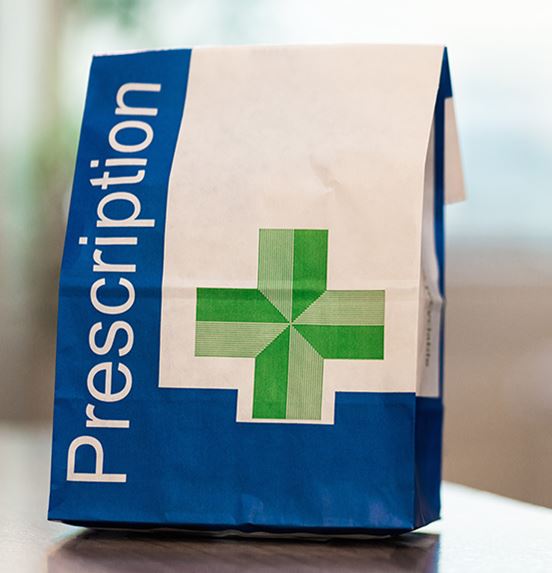Repeat Prescriptions
If you require prescriptions for regular and continuing treatment, it is not always necessary to see the doctor each time. Repeat prescriptions are normally authorised for a period of 6 to 12 months but this may vary with the type of medicine and at the doctor's discretion. After this period you may be asked to attend a medication review before a further prescription is issued.
Repeat prescriptions are computerised and the tear-off slip at the side will indicate the date your review is due.
Give 2 full working days’ notice. Please DO NOT telephone.
Patients are required to put their prescription requests in writing, posting it to us, using the link on this page, or request prescriptions using System online, the NHS App or through Accurx Triage.
Some medications may need to be reviewed with you before they are issued, you will need to see a Doctor for this and will be informed if you need to do this.
Please do not stock pile medication. We will not re-issue medication over 10 days in advance. If you put in a request more than 10 days in advance of running out it may be rejected as too early and you will be expected to request it again closer to the point of running out.
If the surgery is closed, your usual pharmacy or NHS111 may be able to dispense a small Emergency Supply of your medication until you are able to see your doctor.

Request a Repeat Prescription
Prescription Fees
Help with NHS costs
In England, around 90% of prescription items are dispensed free. This includes exemptions from charging for those on low incomes, such as:
- those on specific benefits or through the NHS Low Income Scheme
- those who are age exempt
- those with certain medical conditions
- More information is available at NHS Choices
NHS Charges
These charges apply in England only. In Northern Ireland, Scotland and Wales prescriptions are free of charge.
- Prescription (per item): £9.90
- 12-month prepayment certificate (PPC): £114.50
- 3-month PPC: £32.05
If you will have to pay for four or more prescription items in three months or more than 14 items in 12 months, you may find it cheaper to buy a PPC.
- Telephone advice and order line 0845 850 0030
- General Public - Buy or Renew a PPC On-line
A PPC for HRT is now available and costs £19.80 for 12 months please visit Get a prescription prepayment certificate: If you’ve been prescribed hormone replacement therapy (HRT) - GOV.UK (www.gov.uk) for more information
There is further information about prescription exemptions and fees on the NHS website.
Over The Counter Medication
Prescribing of medication available to purchase over the counter in Cambridgeshire and Peterborough
Cambridgeshire and Peterborough Clinical Commissioning Group does not support the prescribing of medication that is available to buy from local pharmacies or supermarkets for children or adults with common illnesses and minor ailments that they could treat themselves at home.
The medications listed below are examples of medicines that should be purchased by the patient/parent/guardian. This list is not exhaustive.
- Moisturising creams, gels, ointments and balms for dry skin with no diagnosis
- Hay fever remedies eg. antihistamines, nasal sprays (patients over 18yrs)
- Bath oils and shower gel (unless recommended by a specialist for infected atopic eczema)
- Vitamins and supplements eg. low dose vitamin D (less than 2,000units), I-Caps, multivitamins
- Anti-infl ammatory gels eg ibuprofen gel
- Rehydration sachets
- Anti-diarrhoeal medication for short term diarrhoea (less than 72hrs)
- Lubricating eye drops and chloramphenicol eye drops and eye ointment (patients over 2yrs)
- Paracetamol and ibuprofen for short term use
- Laxatives for short term use (less than 72 hours)
- Nasal douches eg Sterimar
- Antifungal preparations eg Canesten
- Head lice treatments
- Threadworm tablets
- Haemorrhoidal preparations eg Anusol
- Antiperspirants
- Cough and cold remedies
- Medicated shampoos eg Alphosyl, Capasal
- Mouthwash eg Corsodyl
- Indigestion remedies eg Gaviscon, Peptac
The reasons for this are as follows:
• Patients are responsible for looking after themselves and their children where possible and for treating self-limiting minor ailments with support from their local pharmacy if needed.
• Patients should keep a small supply of simple treatments in their own medicine cabinet so they are able to manage minor ailments at home. These should be kept secured from young children.
• All these medicines are widely available from supermarkets and pharmacies at reasonable cost.
• Many of these treatments are more expensive when prescribed on the NHS compared to when they are purchased in pharmacies or supermarkets. For example, paracetamol is approximately four times as expensive on prescription.
• The NHS belongs to everybody and the CCG must ensure that its resources are used in the best possible way for all patients.
Patient queries or complaints
Any patient queries or complaints should be directed to the Patient Experience Team on 0800 279 2535 or capccg.pet@nhs.net